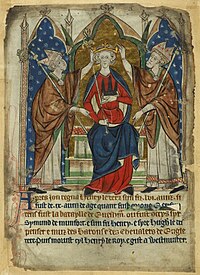| Anglo-Norman | |
|---|---|
| Anglo-Normaund | |
 Manuscript miniature of the coronation of Henry III, accompanied by a short account of his reign in Anglo-Norman prose | |
| Region | Great Britain and Ireland |
| Ethnicity | Anglo-Normans |
| Extinct | 14th century AD[1] |
Early forms | |
| Language codes | |
| ISO 639-3 | xno |
xno | |
| Glottolog | angl1258 |
Anglo-Norman (Norman: Anglo-Normaund; French: Anglo-normand), also known as Anglo-Norman French, was a dialect of Old Norman that was used in England and, to a lesser extent, other places in Great Britain and Ireland during the Anglo-Norman period.[4][5]
According to some linguists, the name Insular French might be more suitable, because "Anglo-Norman" is constantly associated with the notion of a mixed language based on English and Norman. According to some, such a mixed language never existed. Other sources, however, indicate that such a language did exist, and that it was the language descended from the Norman French originally established in England after the Conquest.[6][7]
- ^ "xno". Archived from the original on 11 May 2021. Retrieved 2024-04-05.
- ^ a b Hammarström, Harald; Forkel, Robert; Haspelmath, Martin; Bank, Sebastian (2022-05-24). "Glottolog 4.8 - Oil". Glottolog. Max Planck Institute for Evolutionary Anthropology. Archived from the original on 2023-11-11. Retrieved 2023-11-11.
- ^ Manuel pratique de philologie romane, Pierre Bec, 1970–1971
- ^ For a wide-ranging introduction to the language and its uses, see Anglo-French and the AND by William Rothwell
- ^ Ian Short, A Companion to the Anglo-Norman World, "Language and Literature", Boydell & Brewer Ltd, 2007. (p. 193)
- ^ The Anglo-Norman Language and its Contexts. Boydell & Brewer. 2010. ISBN 978-1-903153-30-7. JSTOR 10.7722/j.ctt9qdjzn.
- ^ Geneviève Hasenohr, Le Jeu d'Adam, édition critique et traduction, Genève, Droz, 2017